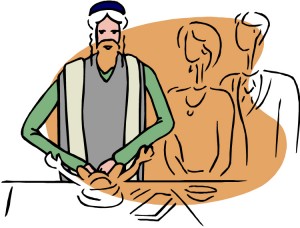This brief teaching is the summation of 40 years of studying what it means to be “under the law.” It’s a hot-button phrase that is repeated often in the Torah-phobic Babylonian church system. Though this article is a little technical at times, reading it will show you how to answer your Christian friends who think you’ve gone off the deep end and fallen from grace with all this Hebrew roots, Torah stuff. Get your Bible out, roll up your sleeves and let’s go deep… Enjoy!
An Analysis of the “Under the Law [Torah]” Passages in the Testimony of Yeshua
Romans 3:19, Now we know that what things soever the law [Torah] says, it says to them who are under the law: that every mouth may be stopped, and all the world may become guilty before Elohim.
Explanation: The Jews were self confident in their special relationship with YHVH because (a) they were Jews and the seed of Abraham, (b) because YHVH had given them the Torah, and (c) because they were circumcised, yet many had failed to obey the Torah, thus making their outward appearance of righteousness (i.e., their circumcision) a pointless sham. Whether one is uncircumcised or not is immaterial; rather, what matters to YHVH is one’s heart orientation toward him (i.e., is one circumcised in heart or not, Rom 2–3:4). After all, circumcision can’t be a salvation issue, since it’s impossible for one half of humanity to be circumcised, while the entire population (both men and women) can be circumcised in heart!
Paul was being accused of promoting Torahlessness because of his stand that circumcision was not a salvation requirement, and that a Jew who is circumcised, and yet lives a Torahless life is no better than a Gentile sinner. In fact, an uncircumcised Gentile who follows the basics of the Torah that are written in his consciences will be blessed on the day of judgment (Rom 2:14–16).
Paul is attempting to level the spiritual playing field (or to tear down the middle wall of partition) between Jews and Gentiles by showing that a hypocritical, law-touting, circumcised Jew has no standing in righteousness before YHVH, while an uncircumcised Gentile who knows little about the Torah, yet follows the light of truth that he has with his whole heart has righteous standing before YHVH.
The bottom line is that Continue reading





